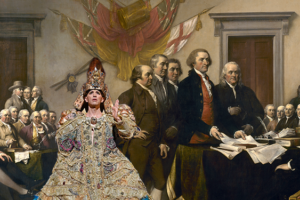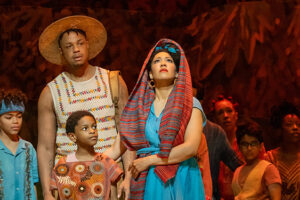

The singer possesses a naturally evocative and shimmery soprano, qualities which are well suited for the role of Violetta Valéry, the Parisian courtesan felled by love and TB. However, when the role turned piano, Yoncheva’s pitch sagged and the intensity of her voice turned shrill and sour.
To a certain degree, these flaws were forgivable, burned away by the sheer force and will of Yoncheva’s Violetta; but there was a distinct variation between the soprano’s robust and emotionally searing vocalism (“Sempre libera,” for example), and the moments in which her voice failed the quiet intensity the role requires. This discrepancy was an inarguable blemish on the entire performance.
Fortunately Michael Fabiano’s more reliable tenor provided ballast to the evening. Looking like Patrick Bateman from American Psycho, handsome but creepy, his reading of Alfredo was potently muscular. He was a respectable match to Yoncheva’s more full-throated passages, and he managed the character’s wide swings between torrential eroticism and smoldering hatred.
Thomas Hampson’s clerical demeanor is suitable for the role of the bougie Giorgio Germont, Alfredo’s father. His voice, however, sounded worn and unstable, marring much of Act II with poor intonation and lackluster vocal production. And he added very little in terms of character development, offering a boorish, presentational reading of Germont that felt inconsequential and unexciting.
Willy Decker’s production, much like Yoncheva’s central performance, is an odd assortment of brilliance and awkward failure, most egregiously symbolized by the giant clock plopped on the stage, a theatrical device that feels obvious and didactic.
A more effective gesture is the figure of Doctor Grenvil, played with eerie intensity by James Courtney, stalking the ingénue from the very beginning of the opera. He is tall, silent, steadfast, and easily forgettable—a caustic angel of death, watching the heroine, and occasionally reminding the doomed woman of her inevitable demise.
However, what is most fascinating about Decker’s production is that it places Violetta’s narrative within in the purely homosocial world of men. Dressed entirely in black tuxedos, the chorus violently grasps and leers at her. She is handled about the stage like a small doll, dressed in red, a splash of color embedded in a field of black fabric—like a small flame, a smear of lipstick, or an open wound.
Moreover, Violetta is never on stage alone. Even her internal reflections are uttered under the watchful eye of Grenvil. It’s a subtle, almost imperceptible touch, to refuse the heroine an experience of freedom or solitude; and it highlights Violetta’s subjugation beneath the male gaze. She exists to be seen, to be watched, to be marveled at, to dazzle, to invoke pathos.
Decker’s production works best when it builds pressure around these themes. The set by Wolfgang Gussmann (who also designed the pitch-perfect costumes) is reminiscent of an arena, suggesting disturbing connections between the opera house and a surgery theater. The lighting is stark, almost fluorescent, and many characters peer down from the upper level, silently watching. In the midst of this, Violetta runs about the stage, up along the wall, stepping on top of a long, curved bench. Sometimes it almost feels as if she’s clawing away at her physical limitations, trying to climb up and get out of the symbolic space that confines her.
When Decker’s production premiered at the Met on New Year’s Eve, 2010, Anthony Tommasini asked in the New York Times if this Traviata would be “the kind of reconceived production that will last for seasons in the future.” More than six years later, the question still remains open—easily asked, but tough to answer. Certainly, the Met’s Traviata is a satisfying iteration—not so radical or provocative, but still austerely interesting.
Photo by Marty Sohl/Metropolitan Opera.























Comments